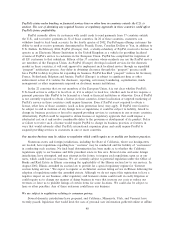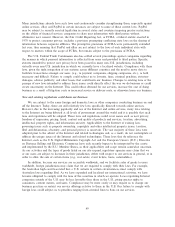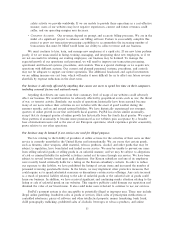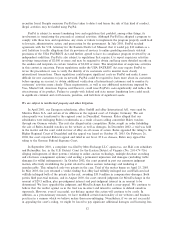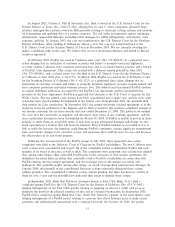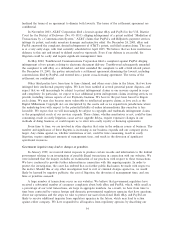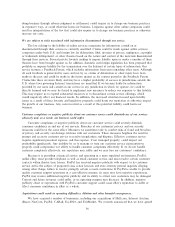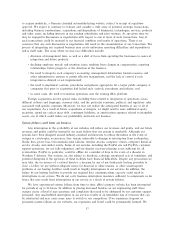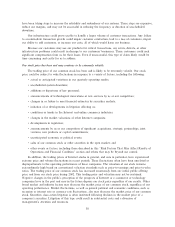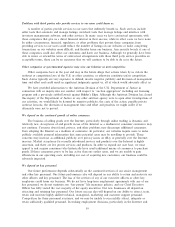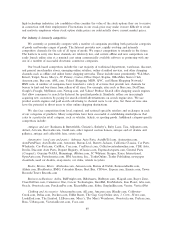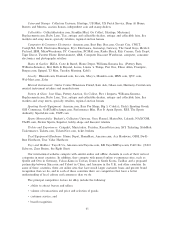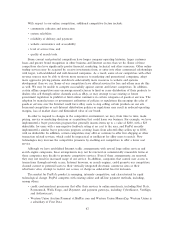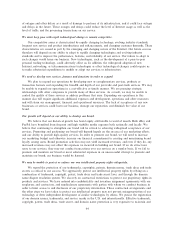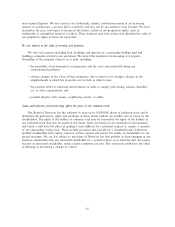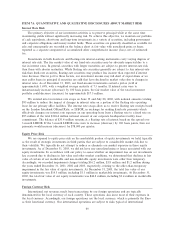eBay 2003 Annual Report Download - page 60
Download and view the complete annual report
Please find page 60 of the 2003 eBay annual report below. You can navigate through the pages in the report by either clicking on the pages listed below, or by using the keyword search tool below to find specific information within the annual report.have been taking steps to increase the reliability and redundancy of our systems. These steps are expensive,
reduce our margins, and may not be successful in reducing the frequency or duration of unscheduled
downtime.
Our infrastructure could prove unable to handle a larger volume of customer transactions. Any failure
to accommodate transaction growth could impair customer satisfaction, lead to a loss of customers, impair
our ability to add customers, or increase our costs, all of which would harm our business.
Because our customers may use our products for critical transactions, any errors, defects, or other
infrastructure problems could result in damage to our customers' businesses. These customers could seek
signiÑcant compensation from us for their losses. Even if unsuccessful, this type of claim likely would be
time consuming and costly for us to address.
Our stock price has been and may continue to be extremely volatile.
The trading price of our common stock has been and is likely to be extremely volatile. Our stock
price could be subject to wide Öuctuations in response to a variety of factors, including the following:
‚ actual or anticipated variations in our quarterly operating results;
‚ unscheduled system downtime;
‚ additions or departures of key personnel;
‚ announcements of technological innovations or new services by us or our competitors;
‚ changes in or failure to meet Ñnancial estimates by securities analysts;
‚ initiation of or developments in litigation aÅecting us;
‚ conditions or trends in the Internet and online commerce industries;
‚ changes in the market valuations of other Internet companies;
‚ developments in regulation;
‚ announcements by us or our competitors of signiÑcant acquisitions, strategic partnerships, joint
ventures, new products or capital commitments;
‚ unanticipated economic or political events;
‚ sales of our common stock or other securities in the open market; and
‚ other events or factors, including these described in this ""Risk Factors That May AÅect Results of
Operations and Financial Condition'' section and others that may be beyond our control.
In addition, the trading prices of Internet stocks in general, and ours in particular, have experienced
extreme price and volume Öuctuations in recent periods. These Öuctuations often have been unrelated or
disproportionate to the operating performance of these companies. The valuation of our stock remains
extraordinarily high based on conventional valuation standards such as price-to-earnings and price-to-sales
ratios. The trading price of our common stock has increased enormously from our initial public oÅering
price and from our stock price during 2002. This trading price and valuation may not be sustained.
Negative changes in the public's perception of the prospects of Internet or e-commerce or technology
companies have in the past and may in the future depress our stock price regardless of our results. Other
broad market and industry factors may decrease the market price of our common stock, regardless of our
operating performance. Market Öuctuations, as well as general political and economic conditions, such as
recession or interest rate or currency rate Öuctuations, also may decrease the market price of our common
stock. Securities class-action litigation is often instituted following declines in the market price of a
company's securities. Litigation of this type could result in substantial costs and a diversion of
management's attention and resources.
58


